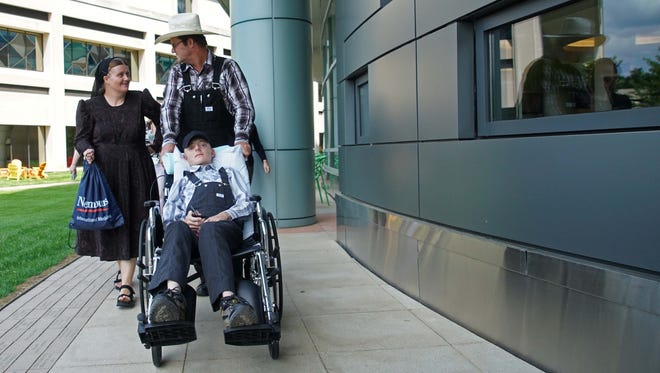How Nemours took care of Mexican Mennonite teen who speaks only a 'dead language'

How do you treat a patient who speaks a language no one in Delaware knows?
It was a question staff at Nemours/A.I. duPont Hospital for Children were forced to answer when they treated Gerhard Friessen Fehr. The 15-year-old boy lives in an isolated colony of German Mennonites in Mexico’s Yucatan Peninsula.
There, they converse in a German dialect that only 12,000 people in the United States know, few enough that the language is considered dead.
For the past three years, Gerhard has suffered from scoliosis that caused his spine to curve at an 80 degree angle, making an X-ray of it look like a slithering snake. It resulted in the teenager experiencing severe pain, especially when he worked in the fields with his father.
At the end of May, he and his parents left their country for the first time in their lives, to come to Delaware for surgery.

While it's not uncommon for the hospital to treat Mennonites, this was the first time Nemours treated a patient who speaks a dead language, said Maggie Veloski, manager of Nemours' international medicine program.
The Mennonite communities in Dover and Lancaster do not speak this German dialect, she said.
After trying several things, a hospital translator spoke to Gerhard's father, Gerhard Sr., in Spanish. The father then translated to his son and wife, Helena, in the German dialect.
Like the other men who live in the colony, Gerhard Sr. was taught Spanish as a teenager in order to conduct business outside of the Mennonite community. The News Journal spoke to Gerhard Sr. through Nemours interpreter Ilana Refaeli.
About 2,600 Mennonites are a part of the insular Mexican colony, which doesn't have an official name. While the beliefs of Mennonites vary across the world, those of the Yucatán Peninsula dress plainly, drive buggies and lead private lives.
Many of the families, like the Friessen Fehrs, are farmers who grow corn, watermelons and soy. The colony shares one phone, located in the community store.
Gerhard Jr. stopped going to school around 12 years old and it was around that time his family started noticing he was having issues with his back. The curve of his spine, which looked like the letter "S," eventually got so severe that Gerhard wasn't able to drive his family's tractor like he once did.
He couldn't walk far distances. He was constantly grabbing his side to help minimize his pain.
After eating breakfast in the morning, Gerhard would lie down for hours at a time and look after his pet birds and rabbits.
The family connected with Nemours after a doctor from the Clinic for Special Children — a practice based in Lancaster, Pennsylvania, that treats Amish and Mennonite patients — examined the teenager when the doctor visited the colony last spring for a medical mission trip.
Because of Gerhard's serious condition and the clinic's referral relationship with Nemours, Dr. Kevin Strauss recommended the teenager receive care at Nemours. The family had previously flown on an airplane to hospitals in Mexico City to seek treatment but were told it would be years before surgeons could perform the procedure.
When Nemours doctors examined Gerhard, they realized he needed another surgery, in addition to the planned spinal fusion, Veloski said.
He first underwent a halo gravity traction, which is a procedure that reduces the degree of curvature in the spine. The surgeons "released a couple tendons of his spine that were holding things tight," Veloski said.
About a week later, Gerhard had his spinal fusion surgery, in which rods and screws are placed to straighten his spine. The teenager was in recovery for about two weeks.
To ease Gerhard Sr. with the burden of translating, volunteers from Mennonite communities in Michigan and South Carolina who speak their German dialect came to Nemours to help translate, Veloski said.
With their help, the family visited the Lancaster Amish community during their stay. Gerhard also enjoyed drinking cans of American Coke, which he liked just as much as the Mexican version.
Gerhard and his family were discharged from Nemours on June 7. Veloski said the next steps for the teenager once returning to the colony is to "reintroduce him to normal life." Doctors gave the family a plan to gradually introduce more physical activity into his life for the next six months.

Gerhard will help his mother with household chores, such as sweeping and doing laundry, for about three months before returning to the fields with his father. He will undergo X-rays of his spine in Mexico in January, which will then be sent to the Nemours surgeons.
"If all goes as planned, as much as we enjoy taking care of him, we don't ever want to see him again," Veloski said. "This time next year, he should be functioning as if this never happened."
Gerhard Sr. said the care his family received in Delaware has made them feel like they were back home in their Mennonite community. The Nemours doctors have been kinder and more helpful than some doctors in Mexico, he said.
"We're going to tell them they treated us so well here," Gerhard Sr. said of how he will describe America to his family.
"We wish the hospital would be closer to us," he said.

Noteworthy Stories:
Does DowDuPont's $200 million investment signal an end to turmoil?
SCOTUS decision likely won't change voter purging system in Delaware
Bill would help oust Delaware teachers who pose a clear threat to kids
Contact Meredith Newman at (302) 324-2386 or mnewman@delawareonline.com and on Twitter @MereNewman.